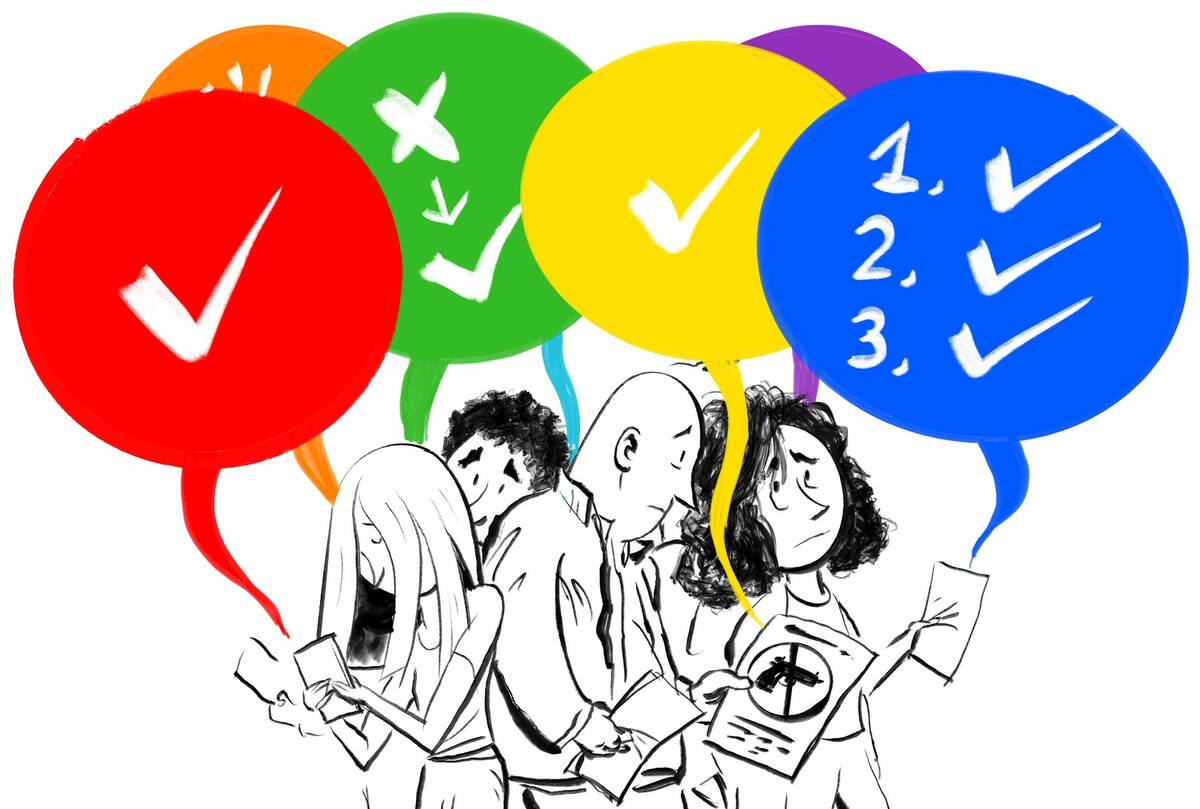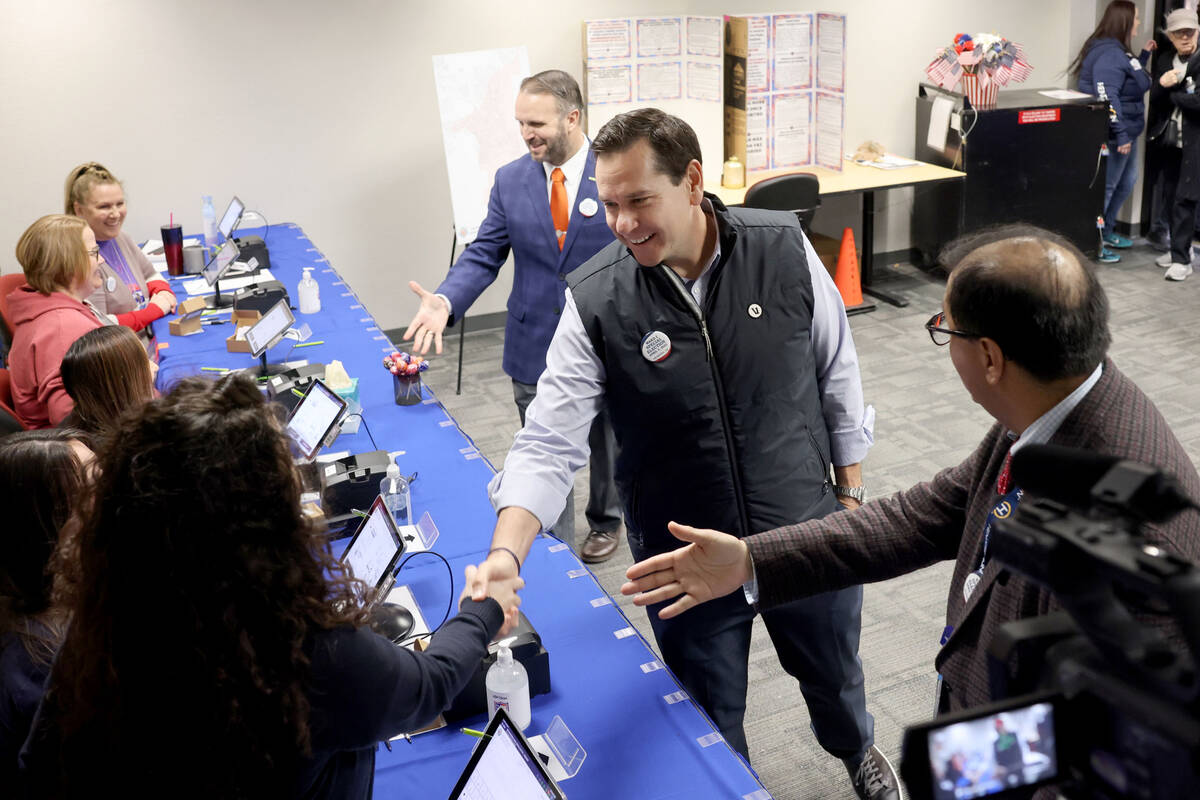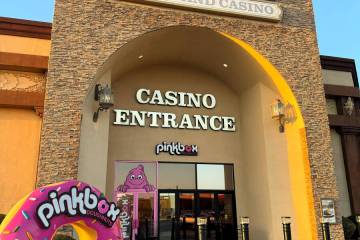Picture this: What Nevada’s elections could look like 5 years from now
Imagine: It’s 2028, and it’s time to go vote in the primary.
You check your phone to see how long the wait time is at your nearest polling site. You’re a nonpartisan, but you wait with Republicans and Democrats to get the same ballot and vote for your favorite candidates, some red and some blue.
Your brother who is overseas in the military already voted using his phone, and your sister mailed her ballot a couple of weeks ago, tracking it online to make sure it got counted.
With proposed election-related bills that legislators are considering this session and initiatives that voters could approve in 2024, Nevada’s elections could look different five years from now.
State government is divided with a Democratic-majority Legislature and a Republican governor, so major changes heavily favored by Republicans or Democrats probably will not happen, such as requiring an ID to vote or expanding mail-in ballots further, said Dan Lee, an associate professor of political science at UNLV.
Still, proposals with bipartisan support could pass, such as increasing security for polling sites, Lee said.
Take Secretary of State Cisco Aguilar’s legislation, Senate Bill 406, which would make it a felony to harass or intimidate an election worker.
By protecting election workers, Aguilar said he hopes to incentivize more people to work for election departments and increase human capacity to improve efficiency. With that measure and other efforts the state is working on to streamline the process, he hopes counting the votes can happen more quickly, too.
“We’re never going to be able to do 100 percent of the races (on election night),” Aguilar said. “But … we can start calling some of the races, especially the local races, on election night. And that’s my goal.”
The Legislature also is considering bills such as Assembly Bill 354, which would prohibit the possession of a firearm within 100 feet of an election site. The bill passed the Assembly Committee on Judiciary on party lines, and Republican Gov. Joe Lombardo has not indicated if he would sign it when it gets to his desk.
Five years from now, Nevada could be a part of the National Popular Vote Compact, if Democratic Assemblyman Howard Watts III’s legislation goes forward, and it could take effect if enough states also sign on. A previous attempt was vetoed by Democratic Gov. Steve Sisolak, and some have brought up concerns about what impact it would have for Nevada in the national spotlight.
“Where Nevada stands right now, Nevada is kind of favored under the current system,” Lee said.
The Electoral College makes Nevada a swing state and draws national attention to Nevada, he said.
Ranked choice and open primaries
The biggest change facing Nevada elections will take effect in 2026 if voters in 2024 decide to pass for a second time the ranked-choice voting and open-primary initiative. The new process would allow nonpartisan voters to participate in the primary, which would not be separated by party, and voters would be able to rank their favorite candidates in order of preference.
The initiative also would drastically change how campaigns are conducted, forcing candidates and political parties to appeal to the more moderate voter rather than the radicals they appeal to during a closed primary. Opponents say it probably would cause parties to spend even more money campaigning, thus tying them more to corporate and interest group donors.
“I think the biggest consequence that it has is it is going to weaken the political parties, which again is what I think a lot of people want and why they support it,” Lee said, “but I think there are negative consequences to that which could end up actually hurting representation.”
Cleaner voter rolls
By 2028, Nevada’s voter rolls could be cleaner, and election data systems could be more efficient, making elections run more smoothly.
In the last legislative session, Assembly Bill 422 initiated the Voter Registration and Election Management Solution Project, which will put in place a centralized, statewide voter registration system instead of having all 17 counties manage their own systems. The goal is to have the system in place by the June 2024 primary, the secretary of state’s office said.
The U.S. Postal Service will connect to the voter registration system, so that when a person moves and changes their address, the system also will be updated, Aguilar said.
“It would help us really ensure that every eligible Nevadan is getting the ballot that they need to vote,” Aguilar said. “And at the same time making sure that there are not extra ballots out in the process, but also brings transparency to the process.”
Right now people can track their pizza on Postmates or Grubhub, and with this system, voters can do the same with their mail ballot. Voters will know when the clerk mailed their ballot and when it arrives in their mailbox, and after the ballot is sent back, they’ll know where it is at all times and when it has been counted.
The Voter Registration and Election Management Solution Project will provide the state data on where and how people vote and will allow the secretary of state’s office to know how each county is doing at all times throughout the election process, Aguilar said. Voters also will be allowed to check how long the wait times are at polling sites.
Mobile voting?
Is voting by phone a part of Nevadans’ future?
Ten states and 300 jurisdictions have begun to pilot mobile voting, with the first being West Virginia in 2018 that explored ways to make voting more convenient for military personnel, their families and others stationed or working abroad. Of the 144 people who participated in the West Virginia pilot program, 53 percent were millennials.
Washington, D.C., heard proposed legislation in 2022 that would bring mobile voting to the city to enfranchise more voters, but it was dropped after experts warned that type of technology is not ready and could further erode public trust in elections.
While mobile voting is not ready, that’s not to say it’s not in the cards.
Every new registered voter is a “digital native” and has grown up with technology, Aguilar said. Sometimes they look at a paper ballot and wonder if there is a more efficient way to vote, he said. Aguilar recently attended the South by Southwest conference, where the idea of mobile voting came up often, talking about how to create that access while also ensuring security.
“It’s going to take time. It’s not going to happen overnight. But it’s something that we have to consider,” Aguilar said.
Assembly Bill 354: Prohibits the possession of a firearm within a certain distance of an election site; passed the Assembly Judiciary Committee.
Contact Jessica Hill at jehill @reviewjournal.com. Follow @jess_hillyeah on Twitter.


















